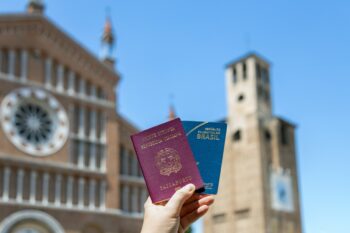 Destinations with Simple Paths to a Second Passport
Destinations with Simple Paths to a Second Passport
Dual citizenship offers many benefits, especially if you want to live or work abroad. However, not all countries make obtaining dual citizenship easy – or even possible. In most cases, you’ll need to have family ties to the country, residency, or invest a significant amount of time and money living there.
The good news is that some countries provide straightforward and affordable pathways to dual citizenship through ancestry, marriage, or naturalization. Below, we highlight some of the easiest countries to get dual citizenship, including popular expat destinations in Europe and the Caribbean.

Find the Best International Medical Insurance
- Compare multiple quotes and coverage options
- Work with an insurance expert at no additional cost
- Find the best plan for your needs and budget
The Benefits of Dual Citizenship
While some countries, such as China, India, and Singapore, don’t allow dual citizenship, or only allow it in certain cases, many countries let you keep your passport from your home country and obtain a second citizenship from another country.
Usually, this secondary citizenship can be acquired through ancestry, marriage, or naturalization.
Dual citizenship can offer greater security and peace of mind amid geopolitical instability. It can also help you access more investment options, employment opportunities, and domestic social services, among other benefits.

Depending on the country from which you get a second citizenship, you may also get more tax benefits and enjoy visa-free travel between nations that have agreements with your new home country.
Passports that allow their holders to travel without a visa, or obtain a visa on arrival, typically for tourism, are considered among the most powerful in the world. Examples include those issued by countries like Japan, Singapore, and Germany.
According to the 2025 Henley Passport Index, some of the world’s strongest passports, granting visa-free or visa-on-arrival access to at least 185 countries, include:
- Singapore
- Japan
- South Korea
- Denmark
- Finland
- France
- Germany
- Ireland
- Italy
- Spain
- Austria
- Belgium
- Luxembourg
- Netherlands
- Norway
- Portugal
- Sweden
- Greece
- New Zealand
- Switzerland
- United Kingdom
- Australia
- Czechia
- Hungary
- Malta
- Poland
- Canada
- Estonia
- United Arab Emirates
- Croatia
All of the above countries have passports that offer visa-free or visa-on-arrival access to at least 185 countries, making travel easier for their citizens.
If you are a citizen of a country that doesn’t appear in the list above, it can make sense to seek dual citizenship in one of the above countries to enjoy greater ease of travel, among other benefits.
Below, we explore how to become a citizen of another country while retaining your original passport.
Our list of the five easiest countries to get dual citizenship includes Ireland and Italy, and three other countries that offer fast and affordable pathways to a second passport.
Read More: What Is Dual Citizenship?
The 5 Easiest Countries to Get Dual Citizenship
Here’s a glimpse into five countries that make it simple to get dual citizenship and the many benefits their passports provide.
1. Ireland
Ireland is one of several countries that grants citizenship if you have family members, such as grandparents, who were Irish citizens. In fact, ancestry is the easiest way to become a dual citizen of Ireland.
If just one of your grandparents was born in Ireland, and you meet all the other eligibility requirements, you can obtain Irish citizenship.
Eligibility requirements include at least three years of permanent residency status in Ireland, but unlike some other pathways to citizenship, they do not include a criminal record check or proficiency in the English or Irish languages.
To start the process, you’ll need to submit an application through the Foreign Birth Register.

Irish citizenship – and an Irish passport – offer incredible freedom of travel worldwide. As of 2025, an Irish passport allows you to travel visa-free or obtain a visa upon arrival to 191 destinations.
This includes most European nations, most South American countries, Australia, China, Israel, Singapore, Hong Kong, South Korea, and the United Arab Emirates. In some countries, such as Mexico, Peru, and Canada, an Irish passport allows you to stay up to 180 days.
Irish citizens are also citizens of the European Union. EU citizenship allows you to live and work in EU and EEA member countries, but there are plenty of great places to live in Ireland, too.
Because nearly 10% of America’s citizens can claim Irish heritage, getting an Irish passport is a popular route to dual citizenship for many Americans.
Read More: Health Insurance in Ireland for Foreigners
2. Italy
Italy offers an easy pathway to citizenship for people whose ancestors were born there. However, the rules are strict, and not everyone qualifies.
Male ancestors can pass on citizenship with few limitations. However, to qualify for citizenship through a female ancestor, the applicant must have been born after January 1, 1948, when the Italian constitution entered into force.
Additional limitations exist for ancestors born in Trentino Alto-Adige, Venezia-Giulia, and Veneto. In those regions, you can only obtain citizenship through ancestry if your ancestor left Italy after July 16, 1920. This is because before this date, any ancestor from these regions would’ve been considered citizens of the Austro-Hungarian Empire, not Italian.
With an Italian passport, you can live and work in any of the EEA or EU countries. You can also take advantage of Italy’s affordable, high-quality educational system.
If you identify a qualifying relative with Italian ancestry, visit the Ministero degli Affari Esteri e della Cooperazione Internazionale website to begin the application for citizenship process.
Read More: Health Insurance in Italy for Foreigners
3. Israel
Israeli citizenship can easily be acquired under the country’s Law of Return. This allows Jewish individuals, including those who convert to Judaism, to enter the country and automatically qualify to become citizens of the state.
Because of government oppression present in a number of countries, Israel applies this right very broadly to the spouses, children, and grandchildren of Jewish individuals of any nationality.

However, Israeli citizenship comes with a number of civic obligations. For example, the country’s universal service laws require all Israeli citizens to commit to military service. Women must complete a minimum of 24 months of military service, while men must complete at least 32 months.
This passport also has some limitations, as Israeli citizens are not permitted to visit several countries in the Middle East.
However, as one of the few countries that offer citizenship without a residency or family requirement, this can be an attractive option if you want the benefits of dual citizenship without having to move or prove ancestry.
Visit the Israeli Ministry of Foreign Affairs to learn more about the application process and eligibility requirements.
Read More: Health Insurance in Israel for Foreigners
4. Paraguay
Paraguay offers one of the most affordable paths to citizenship, but with an important caveat: its constitution only formally recognizes dual citizenship with countries with which it has reciprocity agreements, such as Italy and Spain.
However, in practice, Paraguay generally does not require applicants to renounce their original citizenship, regardless of their country of origin. This means Americans, Canadians, Europeans, and others holding “powerful” passports can typically retain their original citizenship when naturalizing in Paraguay.
With a bank deposit of just $5,585 and three years of residency, citizenship in Paraguay can be yours. Unlike many other countries, Paraguay does not require a minimum income to obtain a residence permit, though some knowledge of Spanish is usually expected.
Learn more about how to become a citizen of Paraguay.
Read More: Insurance For US Citizens Living Overseas
5. Dominica
The Caribbean island of Dominica (not to be confused with the Dominican Republic) offers citizenship by investment. The process is relatively affordable compared to many other countries and comes with some big perks.
A Dominica passport provides visa-free or visa-on-arrival access to about 145 countries, including most of the European Union, South American nations, as well as Indonesia, Israel, Kenya, South Korea, Malaysia, Qatar, the Philippines, Singapore, Tanzania, Hong Kong, and the United Kingdom.

Dominica’s close proximity to Puerto Rico, the French island of Martinique, Barbados, and St. Lucia makes it an attractive option for U.S. and EU citizens who love the Caribbean but want to be able to travel to the U.S. in under two hours.
Through the Dominica Citizenship by Investment Program (CBI), you can obtain citizenship by either making a minimum contribution of $200,000 to the Economic Diversification Fund or by purchasing real estate valued at a minimum of USD 200,000.
Keep in mind that real estate transactions under this program require you to pay government fees, which start at around $75,000 for the main applicant.
Learn more about the Dominica CBI program.
Read More: The Best Countries to Live in as an Expat in 2025
Is It Easy to Get Dual Citizenship?
There are always benefits to becoming a dual citizen, but these may not be the same in every country.
Before you decide where to apply for a second passport, make sure you know what benefits you want and whether this second country will offer them. Some offer visa-free travel to specific destinations, while others may provide income tax benefits or access to high-quality healthcare.
American passport holders can choose from more than 60 countries that allow dual citizenship, though they’ll need to meet all the requirements for the citizenship they want.
Remember that whether you’re a citizen of the U.S. or somewhere else, your eligibility for dual nationality will largely depend on the rules of your home country and those of the country you’re trying to get citizenship in.
Some countries do not allow dual citizenship with other (or any) countries and may require you to renounce your citizenship and passport before you can become a citizen of another nation.
With careful research, you can find the country that best fits your needs and enjoy the security and flexibility that dual citizenship can provide.
Also, keep in mind that securing appropriate health insurance is an essential part of living or working abroad. It’s worth exploring your options early so you can protect your health and finances while enjoying your new citizenship.

Find the Best International Medical Insurance
- Compare multiple quotes and coverage options
- Work with an insurance expert at no additional cost
- Find the best plan for your needs and budget
Read about the benefits of international health insurance and find the best coverage for your new life abroad.
Read More
- The Healthiest Countries in the World in 2025
- Countries With the Highest and Lowest Life Expectancies in 2025
- Top 10 Places for Expats to Live With Their Families
- Best Countries for Digital Nomads and Remote Workers
About the Author:Gayatri is a seasoned travel and lifestyle journalist who has lived in Bangkok, London, Melbourne, and now Hong Kong, where she runs her content agency, The Wordsmith’s Ink, and writes for global publications. When she’s not writing, you’ll find her traveling, working out, watching Formula 1 or the NBA, or getting lost in a good book.
